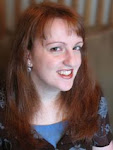Reviewed by
Jessica Day George, Author and Bookshop Talk Host
I would see
this book around when I worked in a bookstore, and being a Scandinavia junkie,
I would often look at it, feel the cover, try to figure out what it
was about. It has a beautiful cover, very evocative . . . and also
slightly obtuse as it doesn’t give you any solid information about the
book. And I didn’t read it.
Then I came
across the title in an article about “Hard to Find Books That Should Be
Classics.” The Greenlanders, according to the author of the article,
was one of the great works of historical fiction, as well as being beautiful
written and was considered an inspiration by other authors of
note. And I didn’t read it.
Listen, the
book is pretty thick, and has fairly small type. There are no
pictures, okay? I knew eventually I would be in the mood for that
book, I just didn’t know when.
So then I came
across a like new copy at a library sale for a dollar, and I bought it and
proudly put it on the shelf of my “fancy” book case alongside all my prettiest
books. And I still didn’t read it.
And then,
suddenly, I WAS in the mood to read it, and it was there and I so totally read
it.
And it was
amazing.
For those of
you who don’t know, the Norse settlement of Greenland lasted about 500
years. They were cut off from the mainland most of the year,
practically nothing grows there except lichen, the Skraelings (Inuit) were
constantly attacking them, yet for five centuries they thrived . . . and then
they suddenly didn’t. The Norse settlement was almost entirely wiped
out after 500 years, by a combination of famine, plague, and senseless murder,
taking them from viable community to a wasteland in a matter of
seasons. Jane Smiley perfectly captures the ending of this society,
viewed through the eyes of Margret Asgeirsdatter and her brother
Gunnar. She shows us every aspect of life medieval Greenland: weddings,
funerals, births, holidays, epidemics, extremes of weather and extremes of
humanity. There are crimes committed, family feuds, witch hunts and
whale hunts. It’s a big, sprawling epic in every sense of the word.
If you have any
interest at all in Scandinavia, I urge you to read this book. If you
like historical fiction of any kind, I cannot recommend it highly
enough. If you like well-written, “literary” fiction, you should
find a copy. If you like to read books of ANY KIND, you need to try
this book. It was just so fabulous!
Market: Adult
Historical Fiction
Language: None
Violence: Some,
including swordfights, and people being killed by arrows or spears, none of it
is graphic.
Sensuality: A
bit of “rolling in the hay” (lichen, actually), not graphic.
Mature Themes:
Adultery, unwed pregnancy, vengeance killings, losing children to starvation or
illness.
Book formats:



























